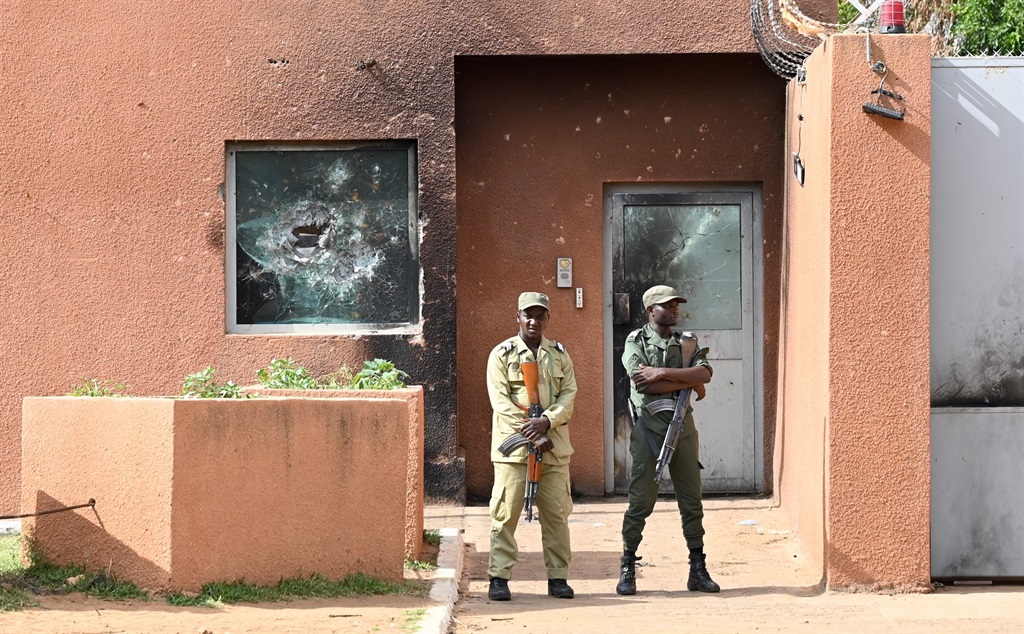

- Niger’s coup leaders stepped up tensions with the country’s traditional ally France on Thursday.
- The regime said France’s ambassador and his family no longer enjoys diplomatic immunity, and must be expelled.
- France has refused to withdraw its representative.
Niger’s new military rulers have stripped France’s ambassador of diplomatic immunity and ordered police to expel him, according to a letter seen Thursday by AFP, a move that ratchets up tensions with the country’s traditional ally.
The envoy “no longer enjoys the privileges and immunities attached to his status as member of the diplomatic personnel in the French embassy,” according to their letter, dated Tuesday, to the foreign ministry in Paris.
“(His) diplomatic cards and visas and those of the members of his family have been cancelled. The police have been instructed to proceed to his expulsion,” it said.
The move follows a coup in the troubled Sahel state on July 26 that toppled a close French ally, President Mohamed Bazoum.
Relations with France spiralled downwards after Paris stood by Bazoum and refused to recognise Niger’s new rulers.
On Friday, the authorities gave French envoy Sylvain Itte 48 hours to leave the country.
France refused the demand, saying that the government had no legal right to make such an order.
On Tuesday, French President Emmanuel Macron singled out Itte for praise after he remained at his post.
French military spokesman Colonel Pierre Gaudilliere on Thursday warned that “the French military forces are ready to respond to any upturn in tension that could harm French diplomatic and military premises in Niger”.
“Measures have been taken to protect these premises,” he said.
France has around 1,500 troops in Niger, many of them stationed at an airbase near the capital, that are deployed to help fight a bloody jihadist insurgency.
On August 3, Niger’s new rulers denounced military agreements with France, a move that the government in Paris has also ignored on the grounds of legitimacy.
An organisation set up after the coup named the Patriotic Front for Niger Sovereignty (FPS) has led public demands for the coup leaders to take a hard line on France.
It has lashed Itte as being a “French citizen in an irregular situation” on Niger’s soil.
It is also calling for a “massive” march next Saturday on the French base, followed by a sit-in until the troops leave.
A landlocked former French colony in the heart of the Sahel, Niger routinely lags at the bottom of the UN’s benchmark of prosperity, the Human Development Index.
It is also battling two jihadist insurgencies — a spillover in southeastern Niger from a long-running campaign in neighbouring Nigeria, and an offensive in the southwest of the country by militants crossing from Mali and Burkina Faso.
Bazoum came to office in 2021 after democratic elections — a watershed in a country that had had no peaceful transition of power since independence from France in 1960.
He suffered two attempted coups before finally being toppled by members of his own guard.
His overthrow triggered alarm bells around West Africa, where since 2020 three other countries — Mali, Guinea and Burkina Faso — have been taken over by the military.
The regional bloc ECOWAS responded by warning it could intervene militarily to restore civilian rule if efforts to end the crisis diplomatically fail.
Swift to support their military comrades in Niger, Mali and Burkina have said that any such operation would be deemed a “declaration of war” against them.
Burkina Faso has approved a draft law authorising the dispatch of troops to Niger, according to a government statement in Ouagadougou on Thursday.
“What affects security in Niger fundamentally affects security in Burkina Faso,” Burkinabe Defence Minister Kassoum Coulibaly said.
However, efforts for a peaceful solution are continuing.
Niger’s neighbour to the north, Algeria, on Tuesday proposed a six-month transition for returning to civilian rule. The military rulers have so far spoken of a three-year handback period.
